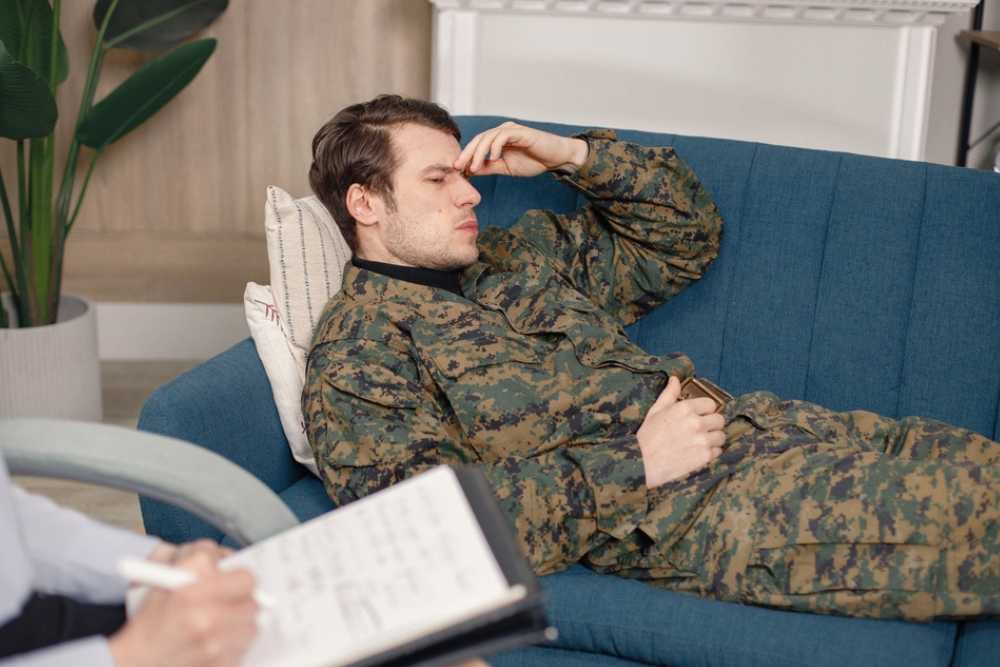Insomnia is a chronic medical condition where a person has trouble falling asleep and staying asleep. The U.S. Centers for Disease Control and Prevention (CDC) recommends that adults get at least seven hours of quality sleep each night. People who work long shifts or overnight are more susceptible to insomnia. This includes military personnel, who sometimes work 12 and 24-hour shifts, which can throw off their body’s circadian rhythm, or natural clock. While insomnia in the military is common, thankfully, there are ways that it can be treated.

Why Do So Many Military Members Struggle With Insomnia?
Insomnia in the military is more common than you might think. According to the Military Health System, about 48.6% of service people have poor sleep quality, and as much as 22.8% live with insomnia. Insomnia is a chronic sleep disorder in which a person has trouble falling asleep at least three times a week for at least three months.
There are several reasons why military personnel may have insomnia or trouble sleeping, such as:
- Shift work requiring military members to work overnight or sometimes for 24 hours
- Stress and trauma caused by exposure to combat and residing in a dangerous military zone
- Living in an environment that is normally noisy, uncomfortable, has no temperature regulation, or has a lot of light exposure.
- Frequent relocations to new locations or living quarters, such as jet lag
- Dealing with a health issue, such as post-traumatic stress disorder (PTSD), depression, anxiety, chronic pain, or traumatic brain injury (TBI)
- Overuse of stimulants like caffeine and nicotine to stay awake
- Family history of insomnia
- Frequent alcohol use
- Sleep apnea (when you stop breathing while asleep, causing you to wake up)
- Restless legs syndrome
- Medical conditions that can impact a person’s circadian rhythm, such as heart failure, chronic obstructive pulmonary disease (COPD), acid reflux, asthma, and hyperthyroidism
- Hormonal changes from menopause
Understanding Circadian Rhythm
These issues can cause insomnia by disrupting your body’s circadian rhythm—the natural sleep-wake clock that tells your body when to wake and sleep during 24 hours. In addition to dictating when you should sleep, your circadian rhythm also influences how long you should rest.
Natural light plays a large role in keeping your circadian rhythm on track. This is why military personnel who work shifts or overnight hours may struggle to keep their natural clock set correctly, leading to insomnia. Body temperature and stress levels can also impact your circadian rhythm.
Can Insomnia Worsen PTSD, Depression, or Anxiety?
Depression, anxiety, and PTSD are three of the most common mental health concerns affecting military personnel:
- According to the Armed Forces Benefit Association (AFBA), more than 23% of military members live with PTSD.
- A study published in BMC Psychiatry in October 2021 reported that about 23% of active service people have depression.
- According to research published in the Journal of Anxiety Disorders, about 15.4% of military personnel have an anxiety disorder.
All three of these mental health issues can lead to cases of insomnia in the military and make it worse.
PTSD
Insomnia is a primary symptom of PTSD. A study published in the journal Psychiatric Annals reports that between 80-90% of people with PTSD also experience insomnia.
Military personnel with PTSD are prone to have flashbacks and nightmares about traumatic events, which can have a negative impact on their sleep. Nightmares can sometimes be so intense that a person will avoid sleeping to prevent them.
PTSD can also cause a fear of losing control while asleep, and can cause a person to be highly vigilant and always on high alert, so they never truly relax.
Depression
Insomnia is a common symptom of depression, or can lead to depression due to a lack of proper sleep. A study published in the journal Neuroscience Research says that about 90% of people with depression also have sleeping issues.
Depression can cause problems for your circadian rhythm, which is your body’s natural clock that tells you when you should be asleep or awake. The stress and anxiety associated with depression can also make it hard for you to fall asleep and can exacerbate insomnia.
Additionally, antidepressant medications can also lead to sleep disturbances and insomnia.
Anxiety
Just like depression, insomnia is both a symptom of and can be caused by anxiety. A study in the journal Scientific Reports reveals that as much as 50% of people with anxiety also have insomnia.
Not being able to sleep at night can be frustrating and upsetting, which can add to your anxiety. Additionally, anxiety causes the release of a hormone called cortisol, which triggers your body’s natural “fight or flight” response. This can make it very hard to allow your body to relax and fall asleep, leading to or worsening insomnia.
Mental Health Treatment That Works
Call 949-625-0564What our customers are saying
What Are the Early Warning Signs of Chronic Insomnia in Service Members?
Symptoms of chronic insomnia in the military population include:
- Inability to fall asleep, even when tired
- Problems staying asleep for the entire night
- Waking up too early
- Fatigue throughout the day
- Focus and concentration issues when awake
- Decreased reaction times
- Memory problems
- Changes in mood, such as depression or irritability
- Headaches or body aches
- Prone to falls or accidents
- Feeling worried or stressed about sleep
When Should Military Members Seek Help for Sleep Disturbances?
Not getting enough quality sleep can have a profoundly negative impact on one’s ability to do one’s job and on one’s quality of life. Additionally, untreated insomnia can increase your risk for several health complications, such as:
- Heart attack
- Stroke
- High blood pressure
- Type 2 diabetes
- Obesity
- Weakened immune system
- Cognitive issues, including dementia and Alzheimer’s disease
- Substance abuse problems
Service people who believe they may have insomnia should seek help from a mental health professional for military service as soon as possible, especially if PTSD, anxiety, or depression accompany it.
There are several treatments available to help manage insomnia, including:
- Cognitive Behavioral Therapy (CBT)
- Stimulus Control Therapy (SCT)
- Light therapy
- Relaxation techniques
- Meditation
- Yoga
- Prescription medications
A mental health professional can help treat insomnia by finding the root cause, helping you work through it, and providing different treatment options based on your specific needs.

Key Takeaways on Insomnia in the Military
- About 23% of military personnel have insomnia.
- There are several risk factors for insomnia in the military due to their work and living arrangements.
- Depression, anxiety, and PTSD can all cause insomnia or make sleep disturbances worse.
- There are several early warning signs military personnel should pay attention to if they think they may have insomnia.
- If you believe you have insomnia, you should seek out assistance from a mental health professional for treatment as soon as possible.
The work and environments of active military members can be extremely stressful and traumatic. At Moment of Clarity, we have designed mental health programs specifically to address the complex needs of active military members and veterans, including long-term treatment for suicidal thoughts. Whether you’re on active duty or making the transition back to civilian life, the specially trained staff at Moment of Clarity can address any mental health concerns you may have and get you the treatment and relief that you need.
If you or a loved one is an active service person who is suffering from insomnia or a mental health issue, call Moment of Clarity today at 949-625-0564 to learn more about our special programs for our military men and women.
Resources
- U.S. Centers for Disease Control and Prevention (CDC) — About Sleep
- Military Health System — Incidence and Management of Chronic Insomnia, Active Component, U.S. Armed Forces, 2012 to 2021
- The Armed Forces Benefit Association (AFBA) — How Common is PTSD?
- BMC Psychiatry — The global prevalence of depression, suicide ideation, and attempts in the military forces: a systematic review and Meta-analysis of cross-sectional studies
- Journal of Anxiety Disorders — Incidences of anxiety disorders among active duty service members between 1999 and 2018
- Psychiatric Annals — Sleep Disturbances in Posttraumatic Stress Disorder: Updated Review and Implications for Treatment
- Neuroscience Research — Bidirectional relationship between sleep and depression
- Scientific Reports — Chronic insomnia, high trait anxiety, and their comorbidity as risk factors for incident type 2 diabetes mellitus




